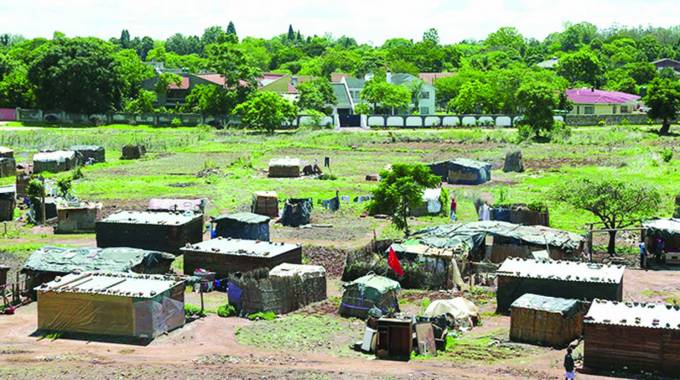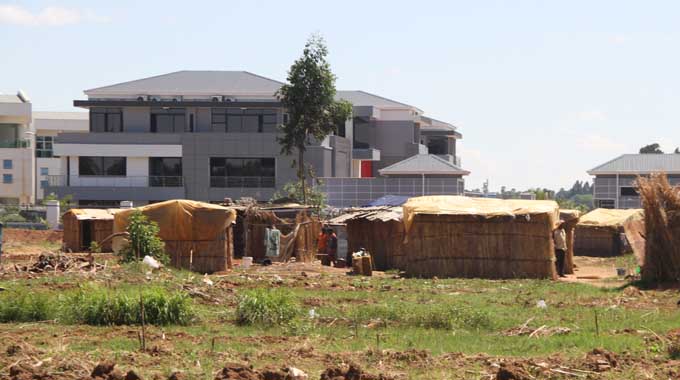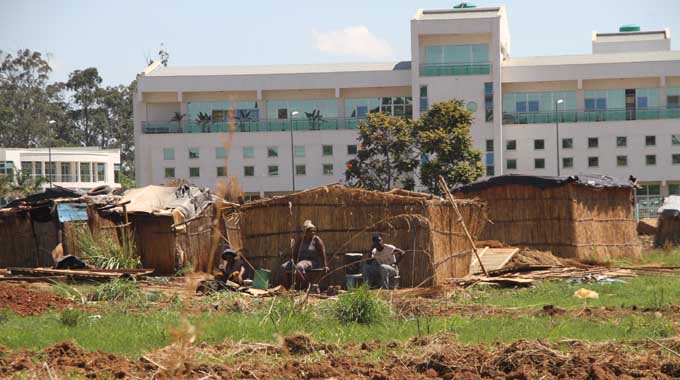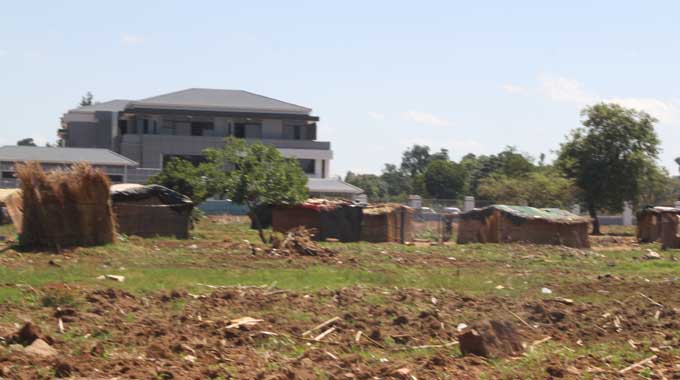
The Sunday Mail

Norman Muchemwa
Owning a house is everyone’s dream as this affords people an opportunity to enjoy basic facilities such as accommodation, water as well as protection from natural phenomena and some adverse weather conditions.
For the Gunhill-Borrowdale squatters, this has remained a pipe-dream as the opportunity once knocked on their door-steps but seven years down the line, the dream is fading away even though they remain hopeful that one day they will get the much-needed assistance.
Less than 100 metres away from the affluent suburbs of Gunhill (on one side) and Borrowdale (on the other), is a sorry site of a squatter camp that has been in existence for many years.

About 120 families call this place their home and they are not even moved by the imposing structures that surround them. They live in grass houses with no proper water sources and ablution facilities and it is only by God’s grace that they have survived cholera and typhoid diseases.
A visit by Sunday Mail Online to the settlement revealed that these people are being denied access to land allocated to them due to some under-hand dealings.
Spokesperson of the group of squatters, Mr Keddy Masango, said they have settled at the place for years and they can now call it their home.
He added that they remain hopeful that the deal to relocate them will be fruitful.

“Our grandfathers and fathers worked at the Borrowdale Race Course many years ago. They were not allowed to stay with families at their work place resulting in the formation of this settlement. We were born and bred here, this is one place we call our home.
“As time went by, an opportunity knocked at our doors as we were remembered through the Melinda and Bill Gates Foundation. Representative of the organisation came here around 2012-2013 using drones to capture this place. A certain amount of more than US$5 million was released for the relocation of 120 families from this place to Mabvuku,” explained Mr Masango.
He added: “We were taken to Mabvuku and we were shown the stands back then. They were measuring 200 square metres for each family. But as you know, we have the issue of land barons and corruption. Later on, people from a co-operative named Federation Housing Co-operative came saying they were now in charge.

“They told us that the stands had been cut by half to 100 square metres. We raised our concern with the authorities including the City of Harare over the matter but up to now, nothing has materialised. They took just few people here and also other squatters they owe some money from Nijo along Domboshava road to make them 39 families they settled in Mabvuku.
“We don’t even know where these Federation guys are coming from. Council is saying we are the custodians of the land and we will give you land, but from the look of things, they are not being sincere about this issue. We appeal to other authorities to help us finalise this issue, we deserve decent houses just like anybody else,” Mr Masango said.
City of Harare acting spokesperson, Mr Innocent Ruwende, said they are working to make sure that these people acquire better stands.
“Some of the people have been allocated stands in Mabvuku/Tafara under an NGO Dialogue on Shelter. We have been working with them to make sure they acquire better and legit housing stands. It is still work in progress,” said Mr Ruwende.
Pressed to comment on the involvement of Federation Housing Co-operative, Mr Ruwende promised to respond but had not done so at the time of publishing.
Harare Residents Trust director, Mr Precious Shumba, told Sunday Mail Online that from their observation, the emergency of squatters is a result of workers in the low-density suburbs who end up bringing their families close to their work place.
“The emergence of squatter settlements in and around Harare’s northern suburbs has been a major trend in urban centres across Zimbabwe. A majority of the illegal settlers start off as workers for the different property owners, and they eventually bring more dependents, and they start erecting their illegal shelters on the outskirts of houses, in open spaces and along streams,” said Mr Shumba.
Read also https://www.sundaymail.co.zw/when-opulence-poverty-exist-side-by-side
“It is usually from these illegal settlements that more people come, and they start offering their gardening skills, landscaping and other part-time jobs to people at very reasonable prices, thus they have a consistent source of cheap labour. The home owners in these areas sometimes raises concerns but there is really not much that they can do about the illegal settlers.”
Another cause of these settlements, Mr Shumba said, is a result of rural to urban migration that has resulted in council being overwhelmed in providing decent accommodation.



